By Poornima Luthra and Vivienne Robinson
Food is an integral part of our existence as humans, more so in some cultures. In Singapore, eating is almost a national past-time. For many, food choices are also deeply personal—when enjoying a meal, not everyone pauses to consider if their meal has an impact on anything beyond their taste buds. Yet as we approach 2020, we are also faced with substantial research, data and information that shows how a plant-based diet is good for both the planet and personal health. Further, our food choices and habits greatly impact the way and extent to which food is grown and produced. According to studies by the United Nations and Eat–Lancet, we must all rethink what we eat if we hope to feed 10 billion people by 2050 without inflicting disastrous consequences on the planet.

Alexandra Food Village Food Centre; image by Tiberiu Ana via Flickr (CC BY 2.0).
To date, approximately 400 million people have adopted plant-based diets, and this is a number that is steadily growing. Global Data estimates that 70 per cent of the global population is either reducing meat consumption or avoiding meat entirely. Common factors influencing a person’s decision to switch to plant-based foods include environmental concerns, food intolerances, health, animal rights, athletic performance and religion. But while we are witnessing global consumer trends shifting in favour of plant-based diets, along with a rise in the number of plant-based food manufacturers, many people are still reluctant to re-examine their food choices.
Plantier’s Definition of Plant-Based Diets A plant-based diet is one that includes vegetables, fruits, grains, nuts and legumes from plant sources, and that avoids all animal products including dairy, meat, fish and eggs. This is different from a vegan lifestyle which includes avoiding all animal products like leather and fur. A plant-based meal is a vegan meal, but a person following a plant-based diet may not be a vegan.
Beyond the Fork: Consequences on the Environment
Embracing a plant-based diet contributes greatly towards mitigating greenhouse gas emissions, excessive water consumption and land usage. According to the acclaimed documentary, Cowspiracy , animal agriculture is responsible for between 18 and 50 per cent of worldwide greenhouse gas emissions—that is more than the combined emissions of all transportation which ranks at 13 per cent.
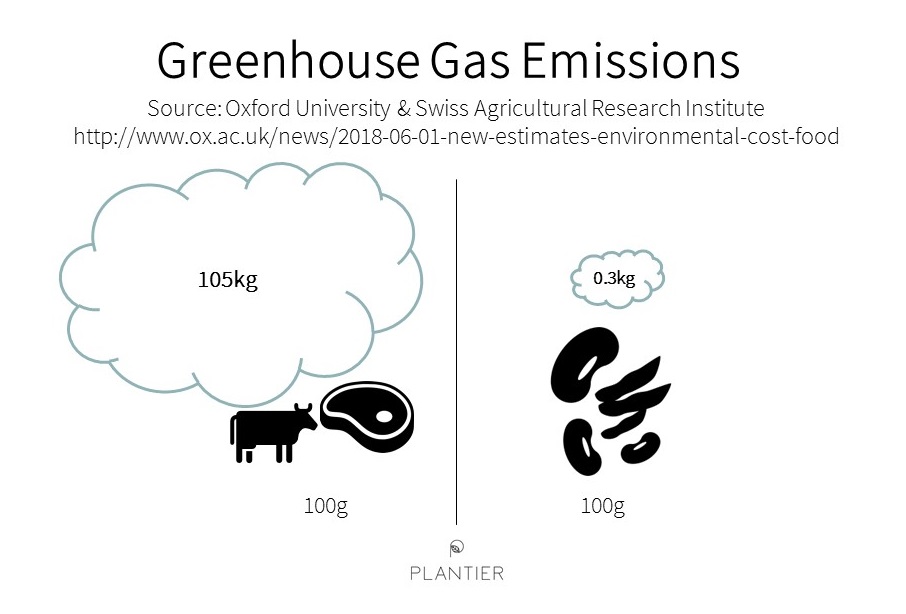
Research from the Water Footprint Network also shows that the “thirst levels” of vegetables and fruits are significantly less than those of dairy and meat. In Cowspiracy , it is estimated that the fresh water needed to produce the meat in one hamburger is equivalent to an average human being having a shower every day for two months. 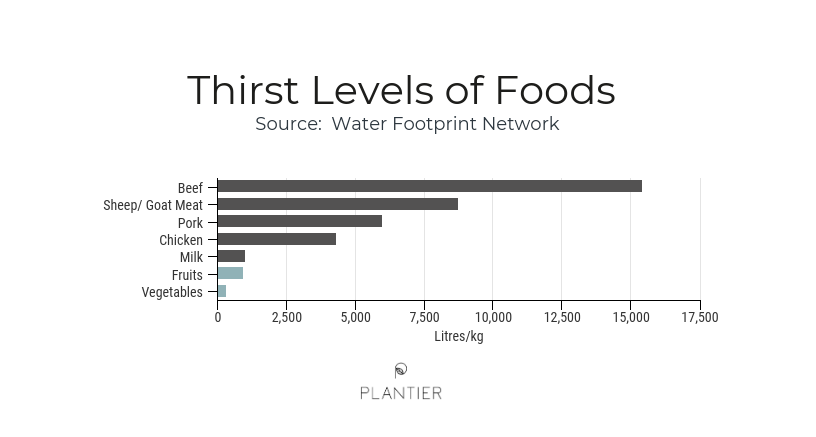
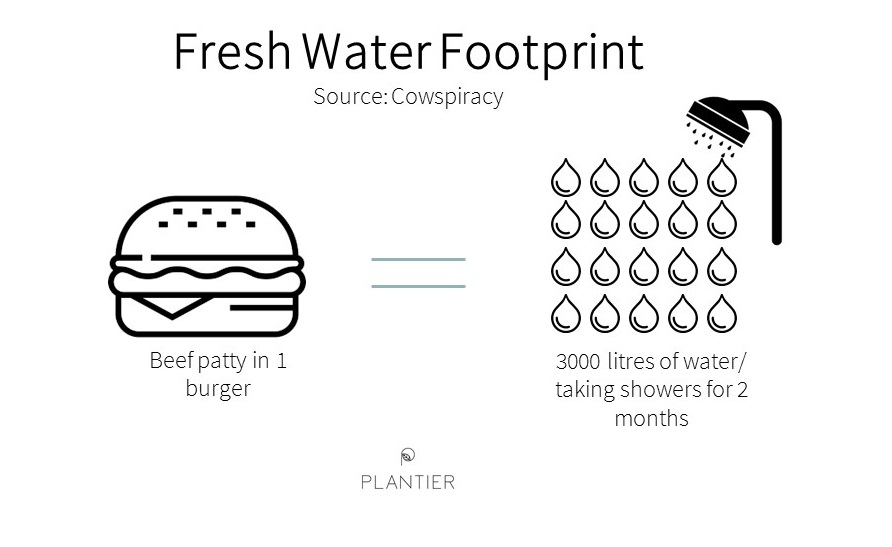 The recent clearing of Amazonian forests for animal agriculture is another stark reminder of the vast lands being used for growing crops to feed the animals, and for rearing the animals themselves. Some may argue that according to a 2018 research study in Science Magazine , over 80 per cent of farmland used for livestock produced only 18 per cent of food calories and 58 per cent of greenhouse gas emissions. However, when considering the scale of environmental impact, we should not just be looking at water and land usage of the grazing livestock, but also that of the crops grown to feed them.
The recent clearing of Amazonian forests for animal agriculture is another stark reminder of the vast lands being used for growing crops to feed the animals, and for rearing the animals themselves. Some may argue that according to a 2018 research study in Science Magazine , over 80 per cent of farmland used for livestock produced only 18 per cent of food calories and 58 per cent of greenhouse gas emissions. However, when considering the scale of environmental impact, we should not just be looking at water and land usage of the grazing livestock, but also that of the crops grown to feed them.
Conscious Consumption: The Authors’ Personal Journeys 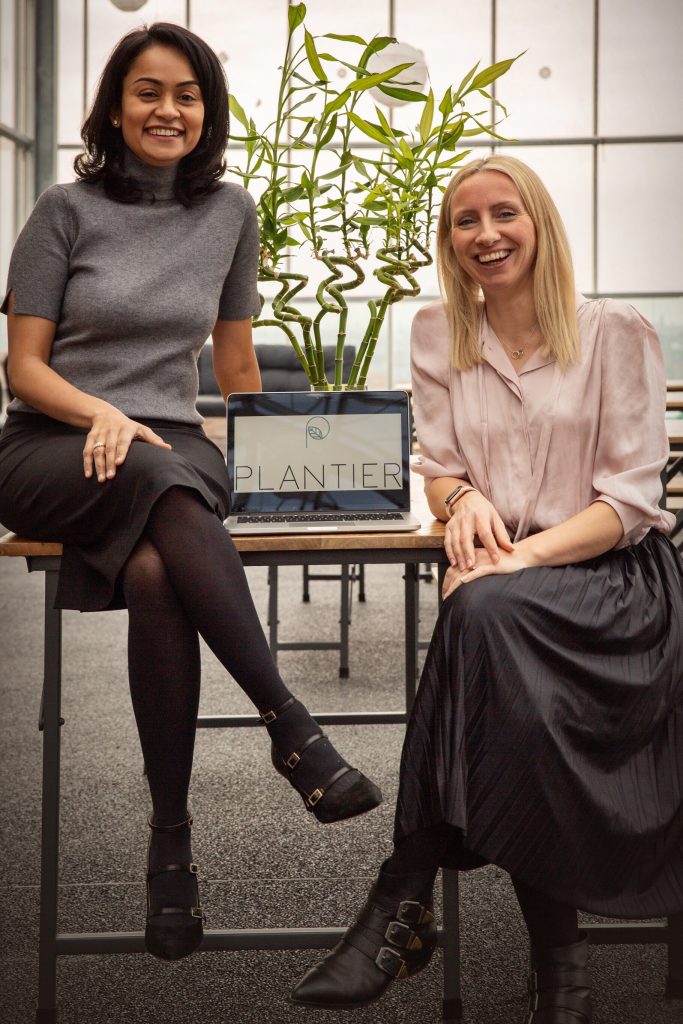
Poornima , an overseas Singaporean, was raised vegetarian for cultural reasons, while Vivienne chose to go vegetarian as a teenager due to a dislike of meat. Several years ago, both ladies underwent food intolerance testing after suffering years of symptoms. Coincidentally their tests results were almost identical, showing a severe intolerance to dairy and eggs. After removing those foods from their diets, Poornima and Vivienne felt much better: their inflammation, bloating and discomfort went away and their energy increased, to name just a few benefits. To pursue their interest in the study of plant-based diets, Poornima and Vivienne pursued their Certificate in Plant-Based Nutrition from the Center for Nutrition Studies at eCornell. Today, having developed a broader knowledge of the impact of meat consumption on human health and the environment, they are sharing this important message to both the food industry and general public.
“So What?” The Evidence–Action Disconnect
Today, data relating to food habits and their consequences on the environment is easily accessible, thanks to the Internet and documentaries like Cowspiracy , Forks over Knives , The Game Changers and What the Health . But building societal consciousness about personal food choices is a complex undertaking: some people may be more open to make diet adjustments, while others may require more convincing. To understand this reticence, we first need to identify the barriers in place.

Image by cattan2011 via Flickr (CC BY 2.0).
Barrier #1: Cultural Traditions The link between food and culture is a deeply intertwined one. The world over, communities bond over food, and every society prides itself on their unique cuisine. Food is also a great way to understand a culture, as it is often integrated with traditions and practices. For the Western world, having turkey at Thanksgiving or a roast pig at Christmas are such deeply rooted cultural practices that switching to plant-based alternatives can seem counterintuitive. In other cultures, too, meat consumption is not just a dietary preference, but also a reflection of one’s status and wealth, and it can seem inconceivable not to serve meat at special occasions like wedding banquets.

Photo by Craig Adderley via Pexels.
Barrier #2: Generational Gaps There also appears to be a “food generation gap” between baby boomers and millennials. The former were raised to believe that cow’s milk was the best source of nutrition (in particular, calcium for healthy bones) and that meat was essential for protein and growth; while the latter are redefining what “eating healthy” means by favouring food that is natural, organic, locally sourced or sustainable. Nonetheless, the millennial-led push towards more plant-based diets seems to be gaining ground across an increasing number of schools, who have entirely or partially removed animal products from their cafeteria menus. They include (among others) the University of Cambridge, Goldsmith, University of London, New York public schools, and a growing list of colleges who are now part of a “Meatless Monday” movement. In Singapore as well, more plant-based eateries are springing up in hospitals and campuses, and advances in food science are bringing about more vegetarian options.
![]()
Image via Unsplash.
Barrier #3: Mental Disconnect In societies where sustainability is not a top priority, people may regard the link between diets and environmental impact as an abstract idea to be addressed by future generations, or believe that their individual actions are too insignificant to make any difference. In highly urbanised cities like Singapore, whose citizens are reported to be eating “three to five times more meat and eggs than is environmentally sustainable”, and where agricultural activity is not visible, there is also a mental disconnect between the food on their plates and how that food is grown or produced.

Image by Jeff Masilungan via Flickr (CC BY 2.0).
Barrier #4: Misinformation (Negative Associations) There is a subtle but misunderstood difference between adopting a plant-based diet and veganism. People following a plant-based diet may not consume animal produce but may still use it in other areas of life such as clothing, accessories and toiletries. Vegans, on the other hand, do not consume or use any animal produce at all; quite often but not always, their decision is based on animal rights. There are unfortunately certain negative associations about those who practise veganism and consume vegan diets, causing others to perceive such choices to be politically motivated, activist or of a “hippie” nature. The negative perceptions and stereotypes of vegans may also have been shaped by extreme cases in which vegans have engaged in violence, threats and disruption towards farmers, journalists, restaurants, supermarkets and other establishments.

Photo by Toimetaja tõlkebüroo via Unsplash.
Barrier #5: Misinformation (Nutritional Deficiencies) With more people embracing greener diets, many food manufacturers have capitalised on this growing consumer group by introducing a plethora of “vegan-friendly” foods, much of which are high in sugar and fat, or highly processed (otherwise known as “vegan junk food”). Plant-based foods, on the other hand, have been found to be largely beneficial to health, as seen in Dr T. Colin Campbell's pioneering nutritional research into the whole food plant-based (WFPBD) diet. The numerous researchers who have since “prescribed” the WFPBD diet have also witnessed incredible transformations in the health and well-being of their patients.
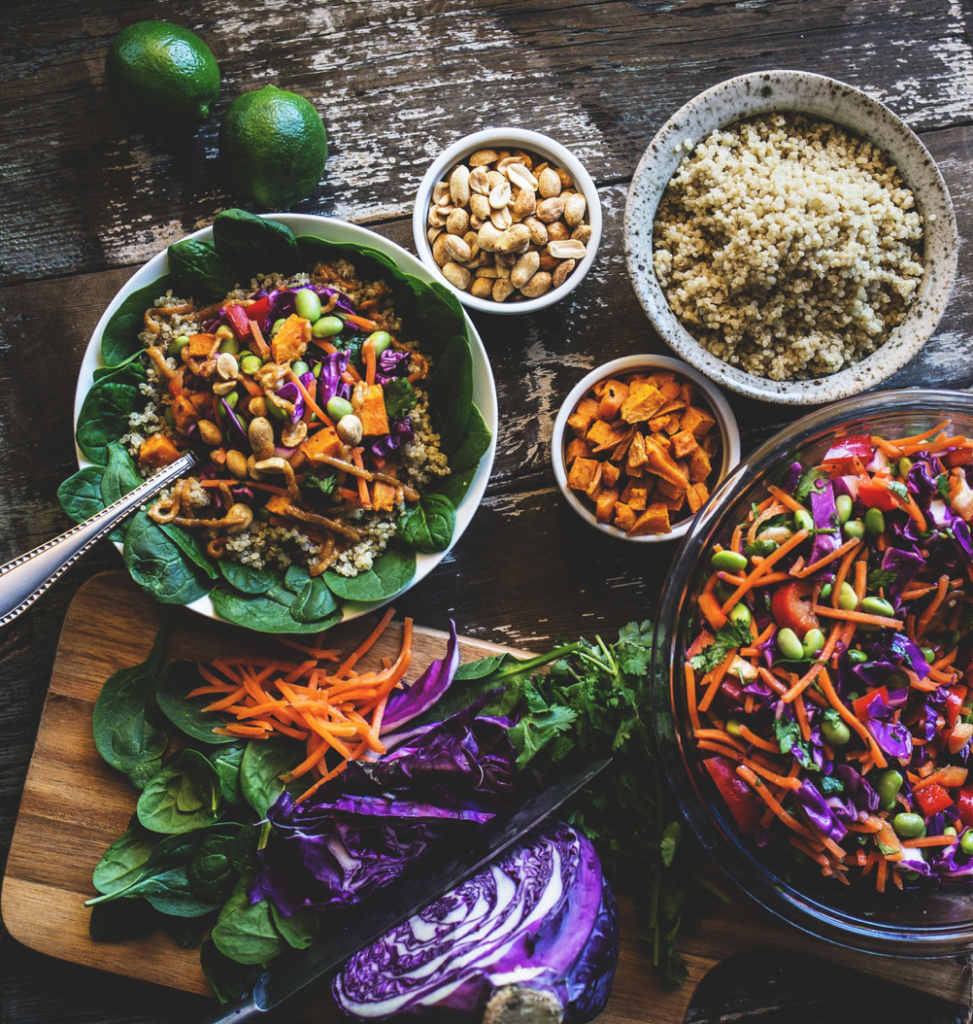
Image via AdobeStock.
Dismantling Barriers: A Better Game Plan
Consistent and Concerted Efforts Getting more people on board with plant-based eating will take consistent and concerted efforts by governments, corporations, media groups, the food industry and individual consumers. At state and policy levels, influencers in the space have suggested setting national carbon reduction goals for the food industry, imposing carbon taxes, or charging businesses for pollution. Health ministries of countries also have the responsibility to verify the credibility of research sources, modify dietary guidelines and push for plant-based knowledge to be shared actively. In this regard, Canada is leading the way with its updated dietary guidelines to promote plant-based diets, and its citizens are encouraged to replace most animal proteins and fats with plant-based sources. In the business space, corporations can influence caterers to provide substantial and delicious plant-based options at the workplace, thus reducing both their carbon footprint and offering employees the nutritional benefits of plant-based meals. Green Monday, a Hong-Kong based organisation, has been hugely successful in inspiring more players in the corporate sector to introduce “green Mondays” in their staff canteens. Singapore's Marina Bay Sands got on board with this movement, and for four consecutive Mondays in July 2019, the company served predominantly plant-based food to its employees.

The kitchen staff of Marina Bay Sands, Singapore participated in Green Monday; image via Green Monday's Facebook page.
The media, in its varied platforms, also carries an important social responsibility. By giving more airtime to content that discusses the impact of animal agriculture and meat consumption on the planet, more awareness can be built around the cause. Further, responsible reporting will go a long way towards combating misrepresentation and inaccurate stereotypes surrounding plant-based eating. Finally, the food industry and its players—caterers, chefs, grocers and restaurateurs—play a huge and significant role in improving consumers’ access to plant-based food, whether at home or when dining out. In Denmark, a study conducted by the Dansk Vegetarisk Forening (Danish Vegetarian Association) revealed that a lack of suitable dining-out options was the top barrier preventing the people there from eating more plant-based foods. Stakeholders thus need to come together to create an inclusive and good-quality customer experience—plant-based customers, like any other, are entitled to substantial and delicious food.
One Step at a Time While the need to fight climate change is urgent, it is extremely crucial to drive the plant-based movement in incremental steps. Efforts to promote a gradual shift rather than an immediate swing will be less overwhelming for consumers, especially those seeking a middle ground. In this regard, flexitarianism, also referred to as “semi-vegetarianism”, is a less intimidating place to begin. According to The Flexitarian Diet by Dawn Blatner, the beginner flexitarian eats 6 to 8 meatless meals a week; the advanced flexitarian eats 9 to 14 meatless meals a week; and the expert flexitarian eats at least 15 meatless meals a week. The food comprises plenty of fruits and vegetables, plant-based proteins from legumes, lentils, beans and nuts, modest amounts of poultry, fish, milk and eggs, and small amounts of red meat. The Planetary Health Diet, based on the EAT–Lancet study similarly recommends that we eat half a plate of fruits, vegetables and nuts; the other half should consist primarily of whole grains, plant proteins (beans, lentils, pulses), unsaturated plant oils, modest amounts of meat and dairy, and some added sugars and starchy vegetables.

Photo by Markus Spiske temporausch.com via Pexels.
Starting with the Individual
Breaking away from well-established food habits can seem daunting, but making some planet-friendly, plant-based swaps is something we can all strive towards. Suzy Amis Cameron, the author of OMD: The Simple, Plant-Based Program to Save Your Health, Save Your Waistline, and Save the Planet , provides a practical guide to changing the world by the simple act of changing one meal a day. In her book, she claims that eating just one plant-based meal a day for a year will save 736,895 litres of water and 350 kilograms of carbon emissions. In other words, if we had three plant-based meals a day for a year, we would save the equivalent of greenhouse gases generated from driving from New York to San Francisco four times. Moreover, “If everyone in the world consumed a predominantly whole food, plant-based diet, nearly 5 billion football fields of land could be restored to forest.”
![]()
Image via rawpixel.
A collective mindset shift starts from an individual decision. It may not be possible for the entire world’s population to go plant-based due to natural or economic circumstances, but for those of us who are privileged with the option to make a conscious switch, it is important that we take that first step.
Banner image via rawpixel.
 |
Poornima Luthra and Vivienne Robinson are the founders of Plantier, a social enterprise based out of Copenhagen, Denmark. Plantier is the voice of the plant-based customer: it aims to inspire and create mindset shifts in the food industry towards having substantial and delicious plant-based options on menus, and encourages efforts to be sustainable and inclusive. Both the authors are graduates of the T. Colin Campbell Center for Nutrition Studies’ Plant-Based Nutrition course, administered via eCornell. Follow @beaplantier on Facebook and Instagram. |








Comments